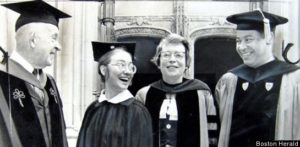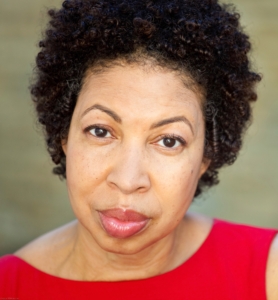Finding Voice
My parents were not joiners. Mom was a healthcare worker. Singing on the church choir and attending occasional PTA meetings was the extent of her activism. My dad, employed as a transit worker, occupied his free time trying to out run his despair. Though both of my parents were members of labor unions (Local 1199 Hospital Workers and the Transit Workers Union), membership in those organizations didn’t inspire activism. They concerned themselves with the day-to-day; social activism was reserved for elites. Plus, there was a feeling that those who spoke loudly thought too much of themselves. Yet, by the very nature of their labor my parents provided a public service. Did that count as activism?
I’ve begun to ask myself what it means to commit one’s life to public service. Teachers, nurses, social workers, firemen and police officers are all, in their way, public servants. Are writers? I suppose it depends on what we choose to write. Can the writing of memoir be a public service? Can it further the cause of social justice? As an MFA student at Antioch I’ve been challenged to find ways to use my writing to further the cause of economic or environmental or social justice. What does that mean exactly? Must the seeds of public service be sown early, or am I capable of growing my empathy and the will-to-serve later in life?
To engage in social activism one needs both a cause and a voice. Since I was raised to conform, to fit in, to know my place within clearly defined boundaries, I had no need for a cause. And since my parent’s usual response to any strong display of independence, assertiveness, or opinion-making was to say, “Be careful, if you behave that way you’ll never have friends and you’ll never find a husband,” my emerging voice floundered and remained stuck in my throat.
They meant well. They were being protective, trying to prepare me for the world they knew and understood. And so, though I chafed under the criticism, I learned to keep my feelings and opinions to myself. Not the best way to foster an activist’s sensibility.
It was, however, a challenging time for my two conservative southern parents. Social mores were shifting. And family was not my only refuge. The year 1967 ushered in the so-called “Summer of Love.” I turned eleven, began to menstruate, and discovered Bulfinch’s Mythology in the school library. I grew obsessed with the Greeks. Athena, the goddess of wisdom and war, became my hero and I secretly began to fancy myself one of her nymphs. Over the next two years I’d live in those stories, partly as an escape from family drama but also in love with the soap opera. Were seeds planted then?
Meanwhile, white women began burning their bras, James Brown’s anthem “Say it Loud (I’m black and I’m proud)” signified the shift from passive nonviolent resistance to a more militant Black Power consciousness, and as the ’60s morphed into the ’70s, I silently began considering my mother’s subservient acquiescence and my father’s bullying with the regal defiance of activist Angela Davis. These events, along with nationwide student protests and the daily count of American war dead, played out nightly on Walter Cronkite and in the pages of my parents’ newspapers and magazines. I soaked it all in. Seeds.
Looking back on those times I ask myself: Did that fierce Athena nymph girl die back then or is she still inside of me? While I write my own creative nonfiction I wonder: Are those seeds still there? Are they just waiting for rain?
The goddess Athena once inspired my private resistance. I now look for inspiration in my present life, examples of voice, courage, and grit that say: Yes. It’s not too late to find a new path, to give back, to defend myself—to find my voice.
* * *
Soon after the close of the Democratic National Convention, I heard the following story on the radio.
In 1969, a twenty-two-year-old Hillary Rodham spoke to her graduating class at their all-women’s college, Wellesley. She was the first graduating student to ever do so at the elite school. That fact seemed odd to me as I began my research for this piece. Wellesley College was founded in 1870. For almost 100 years a female representative of the graduating student body was denied an opportunity to speak. This appears to be a clear dismissal of the feminine voice in an environment where that collective voice should have been predominant. Except for Cornell, the Ivys didn’t begin admitting women until 1977. I can’t imagine the traditionally all-male Ivy Leagues taking that long before allowing a male student the opportunity to address his graduating class.
Rodham spoke after the invited guest speaker had completed his address. The distinguished Senator from Massachusetts, Edward Williams Brooke III, a Republican, was the first popularly elected African American in the United States Senate. He was a centrist Republican, dedicated to civil rights, and was said to be a thorn in the side of President Richard Nixon. Though an advocate for social justice, he believed in fighting “within the system” and was not a fan of public protest. He found much of the protestation occurring on college campuses across the nation problematic. During his address titled “Progress in the Uptight Society Real Problems and Wrong Procedures,” Senator Brooke said:
The waves of protests passing over the United States both mirror and create deep social tension. In some cases one finds it extremely difficult, if not totally impossible, to determine which protests are based on just grievances and which are merely exploiting issues for the sake of some ulterior purpose. It begins to appear that the process of protest has assumed a self-sustaining momentum, searching for political fodder on which to thrive.
Then Hillary Rodham took the stage. She deftly incorporated her concerns over Senator Brooke’s message into her own prepared speech:
[. . .] I find myself in a familiar position, that of reacting, something that our generation has been doing for quite a while now. We’re not in the positions yet of leadership and power, but we do have that indispensable element of criticizing and constructive protest and I find myself reacting just briefly to some of the things that Senator Brooke said. This has to be quick because I do have a little speech to give.
[. . .]
If the experiment in human living doesn’t work in this country, in this age, it’s not going to work anywhere.
[. . .]
But we also know that to be educated, the goal of it must be human liberation.
The response was instantaneous. Though Rodham received a standing ovation from classmates, the administration was not at all pleased, feeling that she had both spoken out of turn and shown disrespect to the Senator. The incident made the national press, with Rodham becoming one of only five student commencement speakers in the country to be featured in the June issue of a Life Magazine article titled “The Class of 1969.”
It was the first and last time a student speaker was allowed to follow the visiting commencement speaker at Wellesley College.
I mention Hillary Rodham’s 1969 commencement speech not because I knew of it at the time, but because it was part of the larger cultural shift occurring, a shift that informed my budding world view. I also mention is as both an example of one woman using her voice in the midst of strong pushback and as an example of Hillary Rodham’s early orientation toward social justice and public service. Our backgrounds are completely different, Rodham was a young woman of far more privilege than I, yet I admire the courage and self-possession required to speak truth to power.
* * *
When the media introduced me to Hillary Rodham Clinton, years after her 1969 commencement address, I was proud that she had chosen to keep her family name Rodham. It spoke to her strength and revealed to the public a woman who trusted her own mind and was clear in her own self-worth. Rodham Clinton, however, would be vilified for her personal show of strength and for her confidence. The biggest challenge in the current effort to create workplace diversity worldwide is not race, but gender. Around the world there is a much greater bias against equality for girls and women than there is towards racial equality. I’m not surprised.
In the midst of this highly unusual presidential race, I can’t help but notice how high the bar is for the first woman to ever win the nomination for President of the United States in a major political party. For forty years, Rodham Clinton has endured queries and comments disparaging her credibility, integrity, trustworthiness, likability, authenticity, appearance, and motivations. She has had to answer the same questions time and time again. She has been called Lady Macbeth, has been accused of having a craven thirst for power and of enabling the sins of her powerful husband. She has been criticized for successfully raising money, an area where men have succeeded for years. A New York Times headline says “Hillary Clinton Victim of her own Success.” At nationalmemo.com you can “Watch Hillary Clinton Answer 40 Years of Sexism.”
It is not my intent to endorse a political candidate (though, admittedly, I have my preference). Nor is it my intent to debate the pros and cons of neoliberalism. The courage to stand in her truth as that twenty-two year old, and the resolve to keep standing in the midst of a world filled with haters inspires me. So it is my intent to express gratitude for the grit and courage required to keep standing and to persevere. The example acts as a warm bath over my own frozen voice box.
Voice is necessary to pursue social justice. My voice is necessary.
Athena would be proud.
Angela Bullock is an actor/writer pursuing an MFA in Creative Nonfiction at Antioch University LA.






